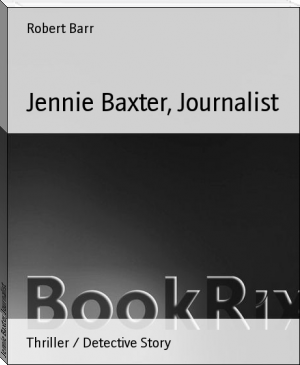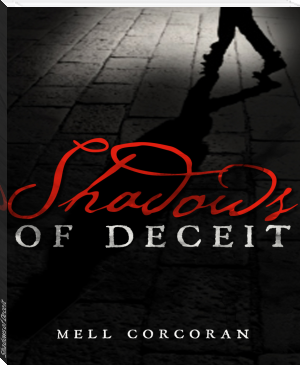Jennie Baxter, Journalist by Robert Barr (top 100 books to read .TXT) 📖

- Author: Robert Barr
Book online «Jennie Baxter, Journalist by Robert Barr (top 100 books to read .TXT) 📖». Author Robert Barr
Here matters rested for a fortnight; then the girl received an urgent note from Cadbury Taylor, asking her to call at his office next day promptly at four o'clock. It was very important, he said, and he hoped she would on no account disappoint him. Jennie's first impulse was not to go, but she was so anxious to learn what progress the detective had made in the case, fearing that at last he might have got on the right track, that she felt it would be unwise to take the risk of not seeing him. If his suspicions were really aroused, her absence might possibly serve to confirm them. Exactly at four o'clock next afternoon she entered his office and found him, to her relief, alone. He sprang up from his table on seeing her, and said in a whisper, "I am so glad you have come. I am in rather a quandary. Lord Donal Stirling is in London on a flying visit. He called here yesterday."
The girl caught her breath, but said nothing.
"I explained to him the reasons I have for believing that it was actually the Princess von Steinheimer whom he met at the Duchess of Chiselhurst's ball. He laughed at me; there was no convincing him. He said that theory was more absurd than the sending him a picture of a housemaid as that of the lady he met at the ball. I used all the arguments which you had used, but he brushed them aside as of no consequence, and somehow the case did not appear to be as clear as when you propounded your theory."
"Well, what then?" asked the girl.
"Why, then I asked him to come up here at four o'clock and hear what an assistant of mine would say about the case."
"At four o'clock!" cried the girl in terror; "then he may be here at any moment."
"He is here now; he is in the next room. Come in, and I will introduce you, and then I want you to tell him all the circumstances which lead you to believe that it was the Princess herself whom he met. I am sure you can place all the points before him so tersely that you will succeed in bringing him round to your own way of thinking. You will try, won't you, Miss Baxter? It will be a very great obligement to me."
"Oh, no, no, no!" cried the girl; "I am not going to admit to anyone that I have been acting as a detective's assistant. You had no right to bring me here. I must go at once. If I had known this I would not have come."
"It won't take you five minutes," pleaded Cadbury Taylor. "He is at this moment waiting for you; I told him you would be here at four."
"I can't help that; you had no right to make an appointment for me without my knowledge and consent."
Taylor was about to speak when the door-handle of the inner room turned.
"I say, detective," remarked Lord Donal, in a voice of some irritation, "you should have assistants who are more punctual. I am a very busy man, and must leave for St. Petersburg to-night, so I can't spend all my time in your office, you know."
"I am sure I beg your pardon, my lord," said the detective with great obsequiousness. "This young lady has some objections to giving her views, but I am sure you will be able to persuade her--"
He turned, but the place at his side was vacant. The door to the hall was open, and the girl had escaped as she saw the handle of the inner door turn. Taylor looked blankly at his client with dropped jaw. Lord Donal laughed.
"Your assistant seems to have disappeared as completely as did the lady at the ball. Why not set your detectives on _her_ track? Perhaps she will prove to be the person I am in search of."
"I am very sorry, my lord," stammered the detective.
"Oh, don't mention it. I am sure you have done all that could be done with the very ineffective clues which unfortunately are our only possession, but you are quite wrong in thinking it was the Princess herself who attended the ball, and I don't blame your assistant for refusing to bolster up an impossible case. We will consider the search ended, and if you will kindly let me have your bill at the Diplomatic Club before six o'clock to-night, I will send you a cheque. Good afternoon, Mr. Taylor."
CHAPTER XI. JENNIE ELUDES AN OFFER OF MARRIAGE.
As Jennie rapidly hurried away from the office of Mr. Cadbury Taylor, there arose in her mind some agitation as to what the detective would think of her sudden flight. She was convinced that, up to the moment of leaving him so abruptly, he had not the slightest suspicion she herself, to whom he was then talking, was the person he had been searching for up and down Europe. What must he think of one who, while speaking with him, suddenly, without a word of leave-taking, disappeared as if the earth had opened and swallowed her, and all because the handle of the door to the inner room had turned? Then the excuse she had given for not wishing to meet Lord Donal must have struck him as ridiculously inadequate. When she reached her desk and reflected with more calmness over the situation, she found no cause to censure herself for her hasty departure; although she had acted on impulse, she saw there had been nothing else to do; another moment and she would have been face to face with Lord Donal himself.
Next day brought a note from the detective which went far to reassure her. He apologized for having made the appointment without her permission, and explained that Lord Donal's unexpected arrival in London, and his stubborn unbelief that it had been the Princess herself whom he met at the ball, seemingly left the detective no alternative out to call on the person who had so persistently advanced the theory, to explain it to the one most intimately concerned. It had not occurred to him at the time to think that Miss Baxter might object to meet Lord Donal, who was an entire stranger to her; but now he saw that he was wrong, etc., etc., etc. This note did much to convince Jennie that, after all, the detective had not seen the clues which appeared to be spread so plainly before his eyes. Cadbury Taylor, however, said nothing about the search being ended, and a few days later Jennie received a disquieting letter from the Princess von Steinheimer.
"My dear Jennie," her Highness wrote, "I am sure the detectives are after you, and so I thought it best to send you a word of warning. Of course it is only surmise on my part, but for days there has been a woman hovering about the castle, trying to get information from my servants. My maid came directly to me and told me what she knew. The woman detective had spoken to her. This inquisitive person, who had come from Paris, wished particularly to know whether I had been seen about the castle during the week in which the Duchess of Chiselhurst's ball took place; and so this leads me to suppose that some one is making inquiries for you. It must be either Lord Donal Stirling or the Duke of Chiselhurst, but I rather think it is the former. I have written an indignant letter to Lord Donal, accusing him of having caused detectives to haunt the castle. I have not yet received a reply, but Lord Donal is a truthful person, and in a day or two I expect to find out whether or not he has a hand in this business. Meanwhile, Jennie, be on your guard, and I will write you again as soon as I have something further to tell."
The reading of this letter greatly increased Jennie's fears, for she felt assured that, stupid as the men undoubtedly were, they verged so closely on the brink of discovery, they were almost certain to stumble upon the truth if the investigation was continued. She wrote a hurried note to the Princess, imploring her to be cautious, and not inadvertently give any clue that would lead to her discovery. Her letter evidently crossed one from the Princess herself. Lord Donal had confessed, said the letter, and promised never, never to do it again. "He says that before my letter was received he had stopped the detectives, who were doing no good and apparently only annoying innocent people. He says the search is ended, as far as the detective is concerned, and that I need fear no more intrusions from inquiry agents, male or female. He apologized very handsomely, but says he has not given up hopes of finding the lady who disappeared. And now, Jennie, I trust that you will admit my cleverness. You see that I had only a word or two from my maid as a clue, but I unravelled the whole plot and at once discovered who was the instigator of it, so I think I wouldn't make a bad detective myself. I am tremendously interested in episodes like this. I believe if I had known nothing of the impersonation, and if the case had been put in my hands, I should have discovered you long ago. Can't you think of some way in which my undoubted talent for research may be made use of? You don't know how much I envy you in your newspaper office, always with an absorbing mystery on hand to solve. It must be like being the editor of a puzzle department. I wish you would let me help you next time you have anything important to do. Will you promise?
"When you write again, please send your letter to Vienna, as we are going into residence there, my husband having been unexpectedly called to the capital. He holds an important position in the Government, as perhaps you remember."
Jennie was delighted to know that all inquiry had ceased, and she wrote a long letter of gratitude to the Princess. She concluded her epistle by saying: "It is perfectly absurd of you to envy one who has to work as hard as I. You are the person to be envied. It is not all beer and skittles in a newspaper office, which is a good thing, for I don't like beer, and I don't know what skittles is or are. But I promise you that the next time I have an interesting case on hand I shall write and give you full particulars, and I am sure that together we shall be invincible."
But one trouble leaves merely to give place to another in this life. Jennie was disturbed to notice that Mr. Hardwick was becoming more and more confidential with her. He sat down by her desk whenever there was a reasonable excuse for doing so, and he consulted her on matters important and on matters trivial. An advance of salary came to her, and she knew it was through his influence with the board of directors. Although Mr. Hardwick was sharp and decisive in business matters, he proved an awkward man where his
 However, all readers - sooner or later - find for themselves a literary genre that is fundamentally different from all others.
However, all readers - sooner or later - find for themselves a literary genre that is fundamentally different from all others. 




Comments (0)